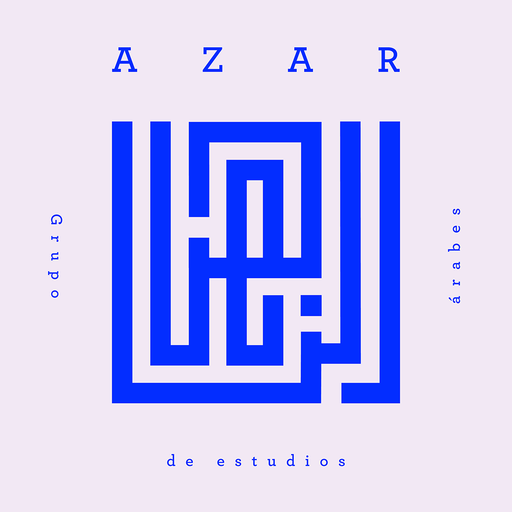
Public activity.
Sold Out * Registration for this workshop is now closed. If you want to join the waiting list send an email to: info@laescocesa.org
No previous training is required.
azar
arab Studies Group
ازهَر الشَّجرُ و ازهَر القمرُ في زَهْرة الدُّنيا فازْدَهَرَت الحَياة
It is not coincidence that the word azar exists in Spanish, it is not coincidence that this language embraces an obvious Arabic identity preserved by the thousands of Arabic words, and it is not coincidence that this evidence disappeared from the collective imagination.
Azar (from the Arabic Azahar-الزهر) means flowers and its meaning "chance" comes from a game of chance whose dice were decorated with an orange blossom on the face that decided your fortune.
Coordinated by Sassouki Salma, a Tunisian producer and cultural mediator living in Barcelona, AZAR is proposed as a space for exchange in relation to artistic, cultural, linguistic and academic knowledge of Arab countries. It is offered in order to recognise the complexity and cultural richness and to strengthen a trans-Mediterranean link that deconstructs the orientalising colonial gaze.
In this first stage of 3 sessions, different aspects linked to dances, music and languages will be dealt with, offering a general, though not exhaustive, introduction to what we define as "Arab culture".
programm
* Session: Suspended *
session 1 - Introduction to Arabic Maqam music
Saturday 19 October 2024 from 11:00 pm to 2:00 pm
Khyam Allami will present an overview of the music of the Arabic-speaking region. More specifically, the heritage of the Maqam, its definition and the varieties and diversity with which this system, which originated in Southwest and Central Asia and which is also an essential element of the music of North Africa and other countries on the African continent, is used, will be discussed.
session 2 - A look at the Arab world through its dances. Nationalism and post-colonialism
Saturday, 9 November 2024 from 12:00 to 14:00 h
Mariem Guellouz gives a general introduction to the particularities of certain dances of the Arab world, which could represent the differences between the 3 main regions: South-West Asia, the Gulf and North Africa. More specifically, she focuses on the dance culture of North Africa, especially Egypt and Tunisia.
From a feminist and decolonial approach, Mariem makes an interactive performance/reading introducing through dance the immense and complex identity of the region, problematising the orientalist and colonial gaze, and its fundamental role in the misinformation and dehumanisation of Arab and North African bodies.
session 3 - Arabic, a mosaic of languages
Saturday 30 November 2024 from 12:00 pm to 2:00 pm
Miguel Jelelaty presents an introduction on Arabic "dialects", "variants" or "languages", and the so-called "Modern Standard Arabic". How do we define Arab languages and Arabic-speaking peoples, what does it mean to say "Arab World", how do we deconstruct a biased perception that reduces hundreds of millions of people to a uniform mass with a monolithic identity devoid of its complexity and richness? This third session addresses the nuances, differences and the relationship between the peoples of the region and their linguistic and national identities.
bios
Sassouki Salma is Tunisian and lives in Barcelona; she holds a BA and MA in cultural mediation from the Sorbonne Nouvelle and an MA in international artistic cooperation from Paris 8. Throughout her career, she has mainly been involved in the production and dissemination of the cultural, artistic and intersectional feminist scenes of North Africa and the Middle East.
Khyam Allami is an Iraqi multi-instrumentalist musician, composer, researcher and founder of Nawa Recordings. Her research and artistic practice explores experimental composition and improvisation based on and inspired by the fundamentals of Arab music and culture.
Mariem Guellouz was born in Tunisia and is a researcher, performer and dancer specialising in dances of the Arab world. She is a university lecturer in sociolinguistics at the University of Paris Cité, and works on militant discourse as a social and political performance. Her work tends to question the contemporary aspect of Arab dances, interpreting them in a hybrid way that links text, image and body. Mariem is also a researcher and teacher, and combines her theoretical research with artistic performance, staging and dancing the archives, texts and sources she works on as a researcher. Her artistic research focuses on a post-colonial and feminist history of Oriental and Arab dance.
Miguel Jelelaty was a lecturer in conference performance at the Universitat Pompeu Fabra between 2006 and 2012. Since 2014, he has been teaching the "Arab World" module in the Master's degree in Protocol at the Universitat Ramon Llull. She has given seminars on interpreting at the Société Française des Traducteurs and on public speaking and persuasion at the Toulouse Business School. He has published several articles on language and society in the Centro Virtual Cervantes and La Linterna del Traductor. He is a bass-baritone, speaks seven languages, his mother tongue is Northern Levantine Arabic (Lebanese variant) and dreams of dying on a Greek island.
This activity is coordinated by Sassouki Salma and Raquel Álamo.
If you have any needs or questions regarding the accessibility of this activity visit the section access La Escocesa

Public activity.
Sold Out * Registration for this workshop is now closed. If you want to join the waiting list send an email to: info@laescocesa.org
No previous training is required.